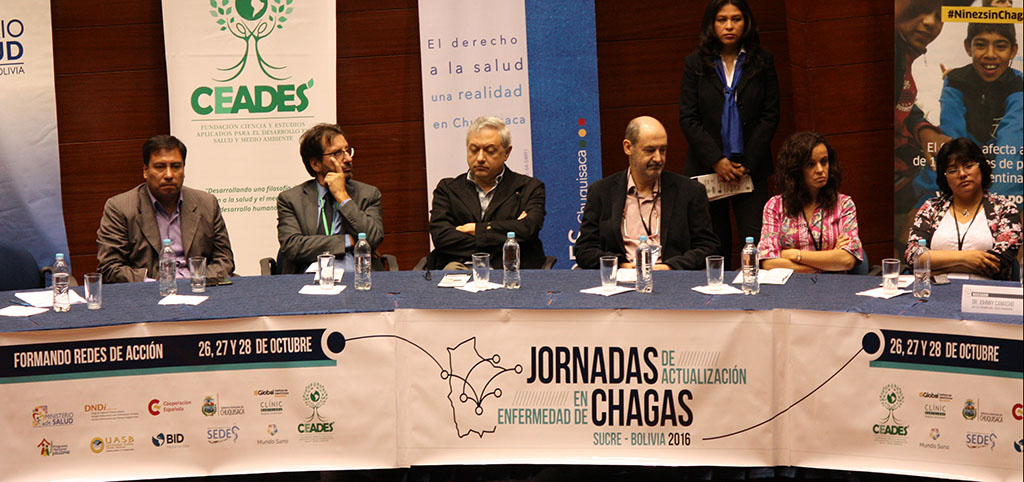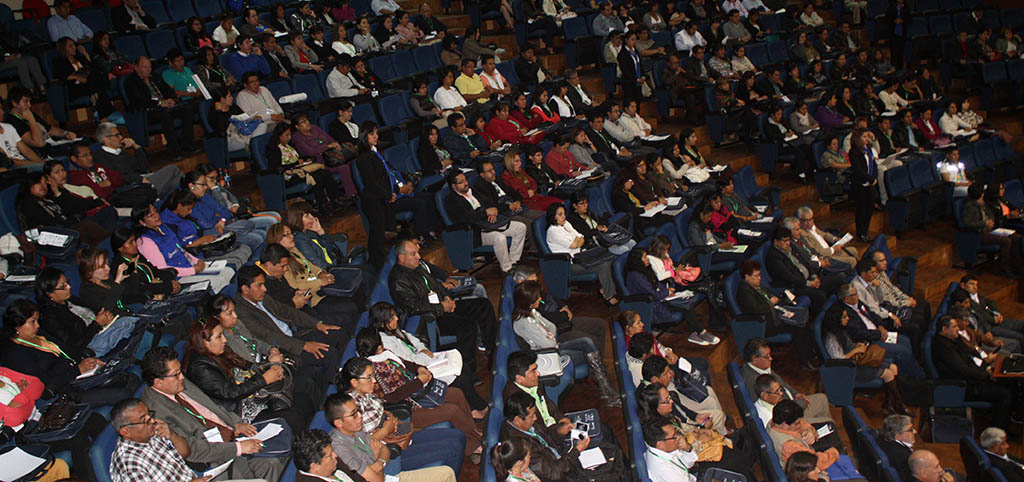Joaquim Gascón on Chagas Disease: “Changing the Situation Depends on All of Us”
Update Conference calls for an increase in early diagnosis and quality care for patients with Chagas disease
31.10.2016
“This situation cannot continue. It is totally inadmissible that less than 1% of patients with Chagas disease worldwide are receiving treatment. Changing the situation depends on all of us." These were the words of Joaquim Gascon, Head of the International Health department at the Hospital Clínic de Barcelona and director of ISGlobal’s Chagas Initiative, during the closing ceremony of the Chagas Update Conference held in the Bolivian city of Sucre on 27 and 28 October last. In the same vein, Rodolfo Rocabado, head of epidemiology at the Bolivian Ministry of Health, argued the case for "developing a better surveillance system" to ensure that the entire population has access to early diagnosis and treatment for Chagas disease.
Faustino Torrico, president of CEADES and co-organiser of the event, and the ISGlobal researcher Maria Jesus Pinazo presented the networked care model and the work of the ISGlobal-CEADES Platform for the Comprehensive Care of Patients with Chagas Disease. The model operates across the six centres that make up the Bolivian platform and Barcelona's Hospital Clínic. “With this model we can coordinate care across national borders, so that patients who migrate can continue with the treatment they need elsewhere” explained Maria Jesus Pinazo. It also facilitates learning and generates data that can be used to inform public health policies on Chagas disease as well as operational and translational research. The health care protocol for patients with Chagas disease developed in collaboration with the Platform is now being implemented by the Bolivian Ministry of Health.
The Way Ahead
Ana Herrera, head of the Bolivian National Chagas Programme, stressed the need for better coordination between national, municipal and departmental levels, with each one taking responsibility for the problem. She made special mention of the efforts being made to prevent vertical transmission and to treat children under 15 years of age; finally, she talked about the global goal of ensuring diagnosis and treatment for all age groups (only 10% of patients diagnosed with Chagas in Bolivia today are receiving treatment).
Some of the clinical cases and studies presented at the event confirmed the feasibility of early diagnosis and the effectiveness of treating infected patients before they develop irreversible heart or digestive lesions. These recent findings contradict the long-held belief that there is no cure for Chagas disease in adults. “We now have sufficient evidence to support the proposal that all patients infected with the Trypanosoma cruzi parasite should be treated except those in whom the disease has reached an advanced stage” reported Rodolfo Viotti, a physician at Eva Perón Hospital in Buenos Aires.
Increasing the number of municipalities where vector transmission has been interrupted, expanding the network of health facilities providing comprehensive care for Chagas disease in Bolivia, and finding ways to accommodate patients who have difficulty attending the clinic in Barcelona are some of the challenges that lie ahead in the fight against the disease in both endemic and non-endemic areas.
Martin Maturano, head of the Departmental Health Service in Chuquisaca, reaffirmed the commitment of his Bolivian department to the fight against Chagas and expressed the hope that research against Chagas disease would be spearheaded in Sucre, the departmental capital.
Faustino Torrico (CEADES) explained that the choice of conference venue was not random. He highlighted the impetus generated by the meeting "for all the professionals working with Chagas disease who are not satisfied with the currently available data and methods and are striving to make progress and update our knowledge as far as possible”. He called on all the participants to come back to Sucre in two years time for the next meeting to share new experiences and learn from those of their colleagues.
The day before the conference, the Chagas Coalition and the Bolivian National Chagas Programme organised a workshop on designing strategies to expand access to the diagnosis and treatment of Chagas disease. The workshop was developed with the collaboration of CEADES, ISGlobal, Doctors Without Borders and FINDECHAGAS. At the same time, the groundwork was laid for a campaign to promote treatment, with particular emphasis on women and children. The campaign will be launched next year and will serve as a pilot experience for other countries affected by Chagas.

About the Conference
The conference, organised by CEADES, ISGlobal-Hospital Clínic, Mundo Sano, and the Departmental Health Services (SEDES) in Bolivia, provides a platform where diverse actors can share their experiences, update their knowledge and find solutions for the fight against Chagas. The meeting was attended by international experts and representatives of the Ministry of Health, the National Chagas Programme and all of the Bolivian Departmental Health Services.



